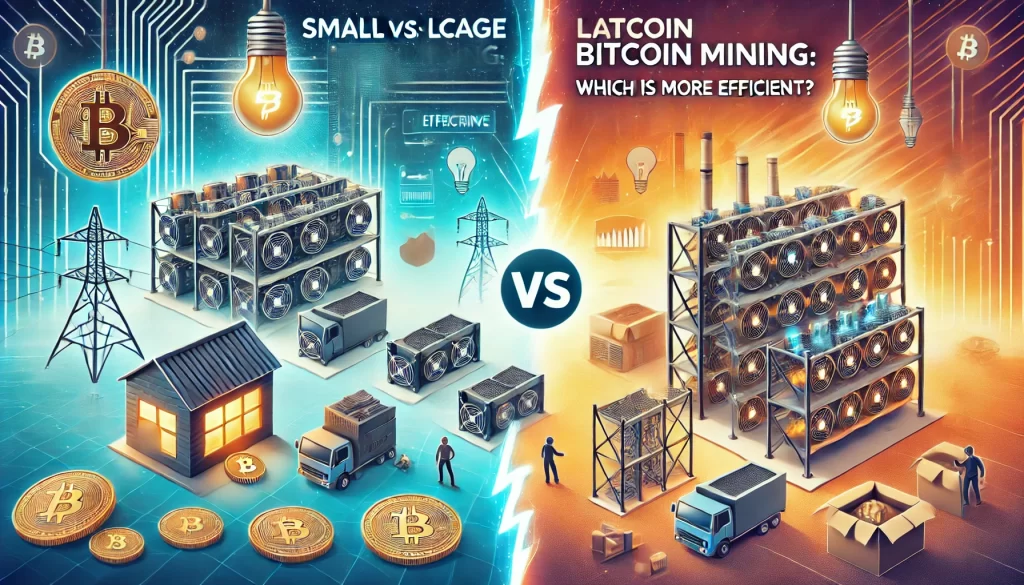Bitcoin mining has come a long way since its early days. What started with a few enthusiasts running mining rigs at home has exploded into massive industrial-scale operations. But here’s the real question: when it comes to energy efficiency, who’s got the upper hand – the little guy mining in his basement or the big players running massive farms?
The Basics of Bitcoin Mining
First off, let’s get something straight. Bitcoin mining isn’t just a fun little hobby – it’s a full-on energy-intensive process. You’re solving complex mathematical problems to validate transactions on the blockchain, and that means you’re going to need some serious computational power. And yeah, with great power comes great energy consumption.
Large-scale mining farms? They’re beasts. We’re talking thousands of machines running around the clock, sucking down energy like there’s no tomorrow. But small-scale miners? They’re usually working with a few rigs, often older or less efficient, but they’re also consuming way less electricity overall. So who’s coming out on top in this energy battle?
Factors Affecting Energy Efficiency
If you really want to know who’s more energy-efficient, you’ve got to look at a few key factors:
1. Equipment Efficiency
Big operations aren’t messing around. They’re dropping serious cash on the latest, most efficient mining hardware out there. These machines are designed to crank out maximum hash rates with minimal energy use. Small-scale miners? They’re often stuck with older, less efficient rigs that need more power to get the same job done.
2. Energy Costs
Here’s where the big boys have a serious edge. They’re negotiating lower electricity rates because they’re using so much of it. They’ll even set up shop in places where energy is dirt cheap or renewable. Meanwhile, the small guys are paying standard residential rates, which can make a huge dent in their bottom line.
3. Cooling Requirements
Keeping those rigs cool is no joke. Large-scale operations have to invest in extensive cooling systems to keep everything from melting down, and those systems guzzle energy. Small-scale miners? They’ve got a few rigs that might not need much more than a fan and some ventilation, so they could be saving on energy there.
4. Economies of Scale
Here’s the kicker: when you’re running thousands of machines, you can spread out the costs – energy, cooling, all that – across the whole operation. That makes each unit of energy more productive. Small-scale miners don’t have that luxury, so they might be burning more energy per Bitcoin mined.
The Role of Renewable Energy
Now, this is a game-changer. The big boys are starting to go green, tapping into hydroelectric, wind, and solar power to cut costs and shrink their carbon footprints. Small-scale miners can jump on the renewable energy train too, especially if they’ve got access to residential solar panels or local sources. But let’s be real – the impact varies big time depending on the setup.
The Bottom Line: Comparing Efficiency
When you stack it all up, large-scale operations generally have the edge in energy efficiency. They’ve got the cash to invest in top-notch tech, they’re scoring cheaper energy, and they’re optimizing their cooling systems. This all adds up to higher energy efficiency, even on a massive scale.
But don’t count the little guys out just yet. Small-scale miners might not be as energy-efficient, but they can still turn a profit, especially if they’re smart about their energy sources. But they’re more vulnerable to the ups and downs of Bitcoin prices and energy costs.
Conclusion
So here’s the deal: small-scale Bitcoin mining might be easier to get into, but it’s generally less energy-efficient than the big operations. The big players are crushing it with economies of scale, cutting-edge technology, and optimized systems that keep their energy use in check.
But as tech evolves and renewable energy gets more accessible, that gap in energy efficiency could start to close. If you’re thinking about jumping into small-scale mining, make sure you’re aware of the energy costs and start looking at ways to optimize your setup for better efficiency.





